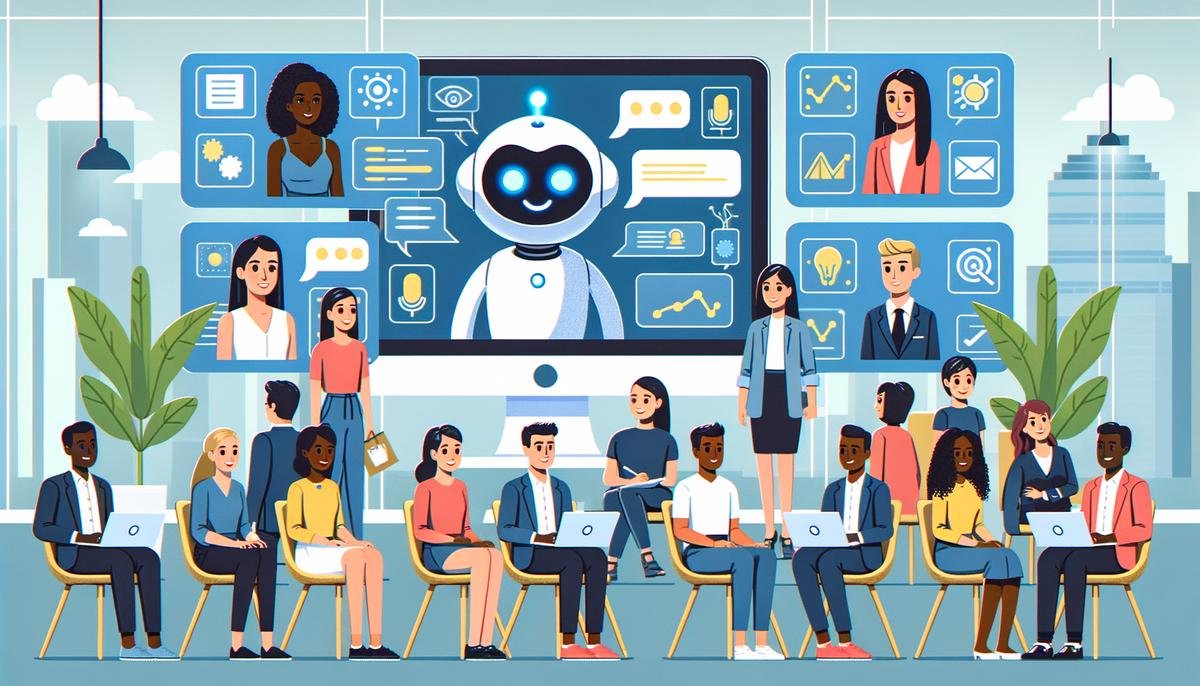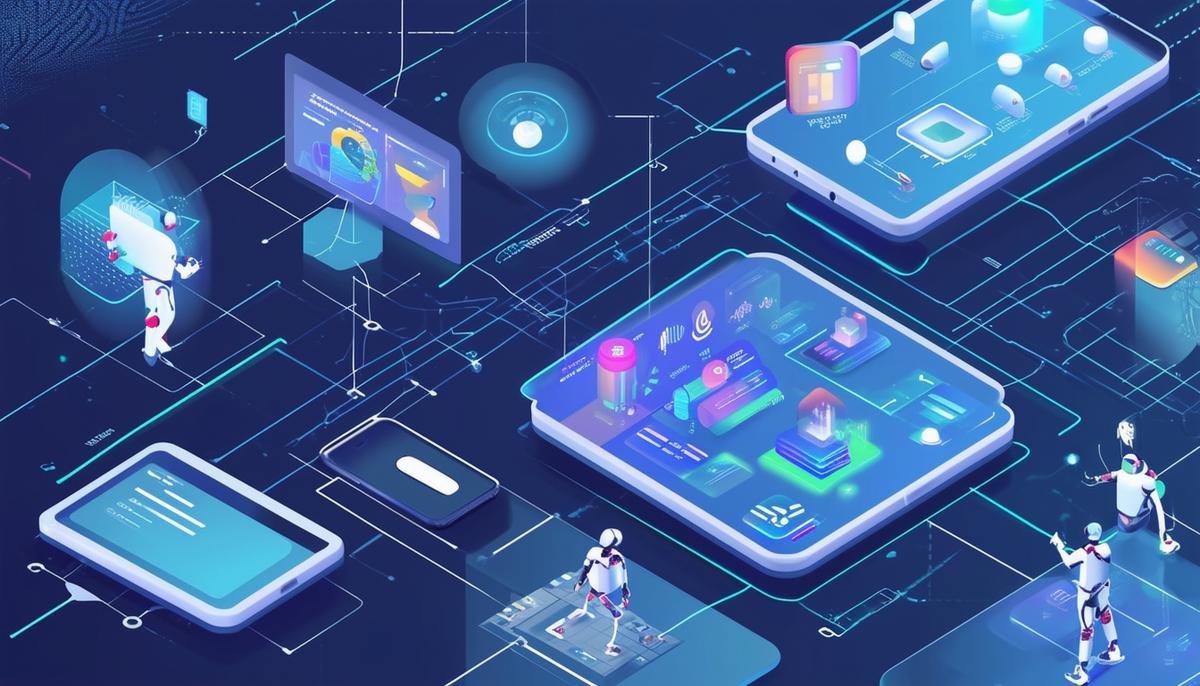Event planning has always been a challenging task, often requiring careful attention to detail and significant resources. However, the integration of AI into event logistics is transforming how planners approach these challenges. By automating routine tasks and providing data-driven insights, AI is making the process more efficient and less prone to errors.
Streamlining Event Logistics with AI
AI can optimize scheduling and resource allocation, making event logistics easier and reducing errors. Tools can suggest the best dates, times, and locations for events by analyzing historical data and real-time information. This reduces the chance of double-booking or picking a bad date. AI can also assist with vendor coordination by tracking deliveries and setups.
Resource allocation is another benefit. AI can determine how many staff members and how much equipment you'll need based on past events. The system can flag if something's low, giving you time to resupply.
Using AI, planners can efficiently create schedules by considering factors such as:
- Venue availability
- Speaker commitments
- Attendee preferences
The risk of forgetfulness is minimized, so none of the event components are overlooked.
For instance, Expo Logic's AI tools improved processes for Northwestern Mutual Life Insurance Company, reducing required staff members. Stephanie Armbrust, Meetings Registration Coordinator, noted that there was no need to "double-check" everything repeatedly.
AI simplifies logistics, enabling planners to focus on creating engaging events without getting bogged down in details. The chances of something going wrong diminish as the system automates many repetitive tasks, ensuring the event is both efficient and effective.

Enhancing Attendee Engagement
AI enhances attendee engagement by offering personalized experiences. Understanding attendee preferences, AI tools can recommend sessions and activities individually customized. This level of customization improves attendee satisfaction by aligning the event's offerings with individual interests.
AI can analyze data from registration forms and past interactions to suggest relevant sessions and workshops. Customized schedules can be auto-generated, ensuring each attendee's agenda maximizes their time and relevance at the event.
Networking becomes easier with AI-powered tools that match attendees with similar interests or complementary goals. Networking apps can set up meetings or suggest conversation starters based on shared interests or professional backgrounds.
Event apps can offer real-time feedback features through chatbots, immediately addressing any issues an attendee may have. AI can monitor engagement levels and suggest changes on the fly, such as:
- Pushing notifications for highly anticipated sessions
- Adjusting breakout sessions based on real-time interest
A case in point is the SHOT Show by the National Shooting Sports Foundation (NSSF) and ConvExx, where AI-powered personalization played a role. Exhibitors used the GoExpo Dashboard to manage their event participation, while attendees benefited from a customized experience through the event's mobile app.
By offering personalized experiences, events can achieve higher engagement and satisfaction rates. Personalized content and interactions make the event more enjoyable and increase the likelihood of positive feedback and return attendance.

AI-Powered Data Analysis and Insights
AI-powered data analysis allows planners to process large amounts of event data efficiently and extract actionable insights. This capability is useful for making data-driven decisions that enhance event management.
AI can identify:
- Which sessions had the highest engagement
- Which speakers were the most impactful
- Which marketing strategies drove the most registrations
These insights allow planners to fine-tune future events.
Understanding attendee behavior in real-time is also beneficial. AI tools can track live feedback and engagement, allowing planners to make on-the-spot adjustments. This dynamic decision-making process ensures the event remains engaging and responsive to the audience's needs.
AI's ability to predict future trends based on historical data adds another layer of intelligence to event planning. You can anticipate which topics will be popular, estimate attendance numbers more accurately, and predict logistical needs like catering quantities or room capacities.
AI can also bolster marketing efforts. By understanding which campaigns yielded the highest returns, planners can optimize their strategies, leading to better-targeted marketing and higher engagement.
Harnessing AI for data analysis fuels a cycle of continuous improvement, turning feedback and data into strategic actions that enhance event quality and attendance satisfaction consistently.
Cost Savings and Efficiency
AI offers opportunities for cost savings and efficiency in event planning. By automating repetitive tasks, reducing the need for large customer service teams, and optimizing resource allocation, AI helps planners streamline their operations and allocate resources more effectively.
AI automates routine administrative tasks like:
- Booking venues
- Scheduling appointments
- Tracking guest lists
This saves time and enhances accuracy and consistency in communication.
AI-powered chatbots can handle a wide range of inquiries, reducing the need for large customer service teams. These bots ensure that attendees receive immediate responses to their questions, improving their experience while reducing the burden on human staff.
AI also excels in optimizing resource allocation. Based on historical data and predictive analytics, AI can determine the exact number of staff members, equipment, and supplies needed for an event. This helps prevent overstaffing or understocking, thereby reducing unnecessary expenses.
While AI can manage many logistical aspects, the role of human interaction remains important. Effective event planning requires a balance between AI and human touch. Human planners bring creativity, emotional intelligence, and problem-solving skills that AI lacks.
AI can support human planners by providing real-time data and insights, enabling them to make informed decisions quickly. This dynamic responsiveness enhances the overall attendee experience.
Event planning platforms like Bizzabo have integrated AI tools to assist planners while still emphasizing the importance of human oversight. By leveraging AI for data analysis and resource optimization, planners can enhance operational efficiency and cost-effectiveness without sacrificing the personalized experience that attendees value.

AI Tools for Event Management
Today's event planners have various AI-powered tools at their disposal, enhancing how events are organized and managed. These tools range from chatbots that handle attendee queries to virtual event platforms that facilitate online interactions.
Chatbots provide instant customer support. For instance, HubSpot's AI-powered chatbot can manage participant queries, enabling 24/7 communication and reducing the need for extensive customer service staff. Reed & Mackay incorporated AI chatbots into their workflow, resulting in decreased human resource expenses while maintaining high customer satisfaction levels.
Analytics tools like Google Analytics and Adobe Analytics offer data insights that can impact event planning and execution. These tools track attendee behavior on event websites, measure engagement levels, and examine the success of marketing campaigns.
Virtual event platforms have become important, especially during the pandemic. Platforms such as Zoom, Hopin, and Brella offer features for organizing virtual conferences, webinars, and networking events. These platforms support:
- Live streaming
- Interactive Q&A sessions
- Breakout rooms
Bizzabo's AI-powered platform allows for customized attendee journeys, from personalized agendas to targeted networking opportunities. By analyzing attendee data and behaviors, Bizzabo can suggest relevant sessions and connections, ensuring each participant finds value in the event.
These AI tools enhance operational efficiency and deliver a more personalized experience for attendees. By automating routine tasks, providing data-driven insights, and enabling real-time adjustments, AI empowers event planners to focus on strategic, creative aspects that make an event stand out.

Real-World Examples of AI in Events
The Master's Golf Tournament collaborated with IBM Watson, integrating AI to create an experience for attendees. IBM Watson's Natural Language Processing capabilities enabled a chatbot to engage with attendees, answer questions, and provide real-time updates. Predictive analytics were also employed to offer insights into players' performance.
The Google I/O Developer Conference leveraged AI for inclusivity and accessibility. AI-powered live captioning was implemented across all sessions, displayed on large screens for attendees. This ensured that those who were hearing-impaired or non-native English speakers could fully participate and understand the content being presented.
Expo Logic's AI-driven tools, employed by Northwestern Mutual Life Insurance Company for their events, reduced the number of required staff members. This optimized staff resources and increased job satisfaction among employees.
The National Shooting Sports Foundation's (NSSF) SHOT Show used AI to enhance the exhibitor and attendee experience. Using the GoExpo Dashboard, exhibitors could manage their participation efficiently, while attendees benefited from a personalized mobile app experience.
Hopin, a virtual event platform, leveraged AI tools to allow for seamless transition between live and pre-recorded content, interactive sessions, and networking opportunities. Attendees could benefit from personalized content recommendations and networking suggestions based on their profiles.
Reed & Mackay implemented AI-powered chatbots that provided 24/7 customer support, addressing attendee queries effectively and reducing the need for an expansive customer service team.
These examples illustrate how AI can bridge the gap between logistical challenges and attendee engagement, ensuring a smoother and more effective event experience.

AI is changing event planning by automating tasks, optimizing resources, and enhancing attendee engagement. This shift allows planners to focus on creating memorable experiences while ensuring operational efficiency. As AI continues to develop, its role in event management will become more important, setting new standards for success.
- Militello S. The tipping point for us was the amount of data we could collect with Bizzabo, queuing up feedback surveys every day immediately after the event, and having it come simultaneously through the platform we are already familiar using. Compass.
- Whitsun-Jones J. Because the industry is so varied, organisations can adapt and implement AI in various situations. As AI technology continues to develop, I am excited about how it can be tailored to support different events. Reed & Mackay.
- Tod K. While AI can assist in monitoring attendee tracking and technical troubleshooting, there are limitations to the technology. Reed & Mackay.




